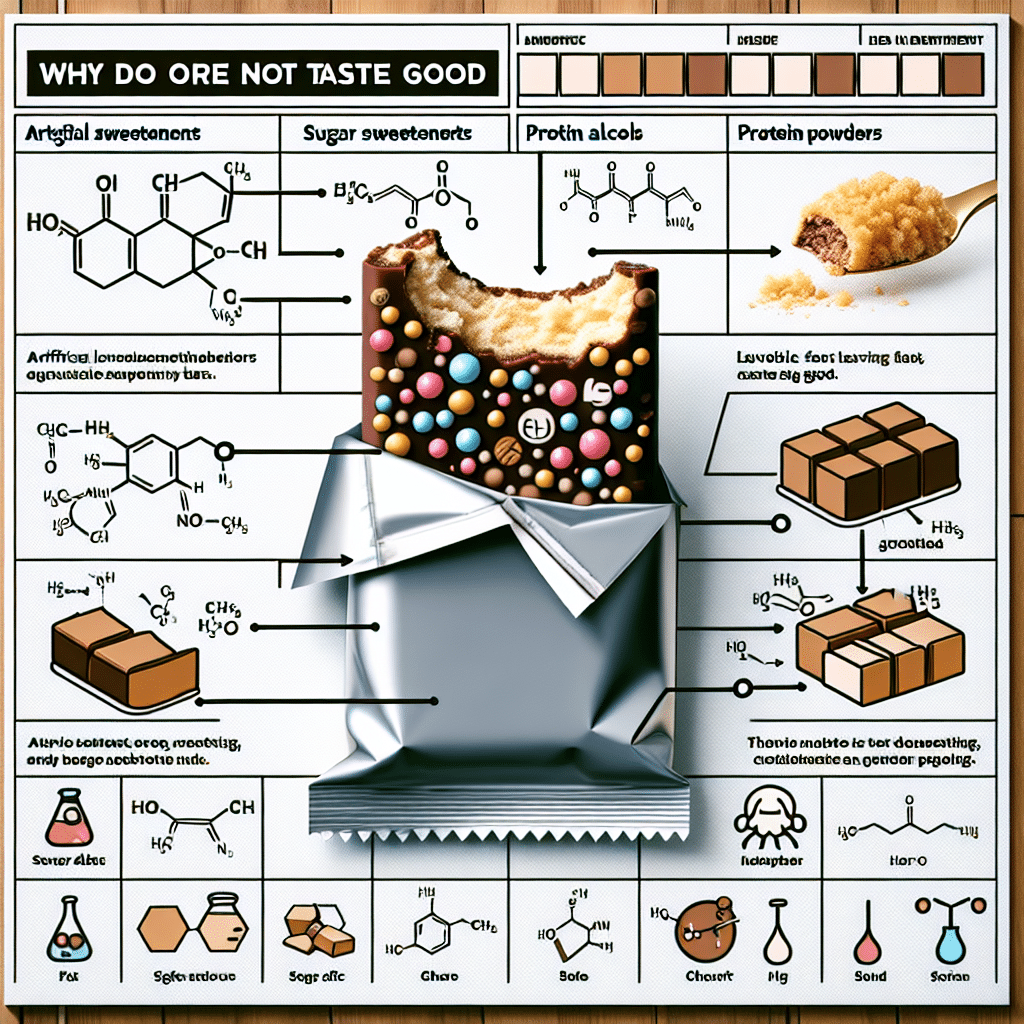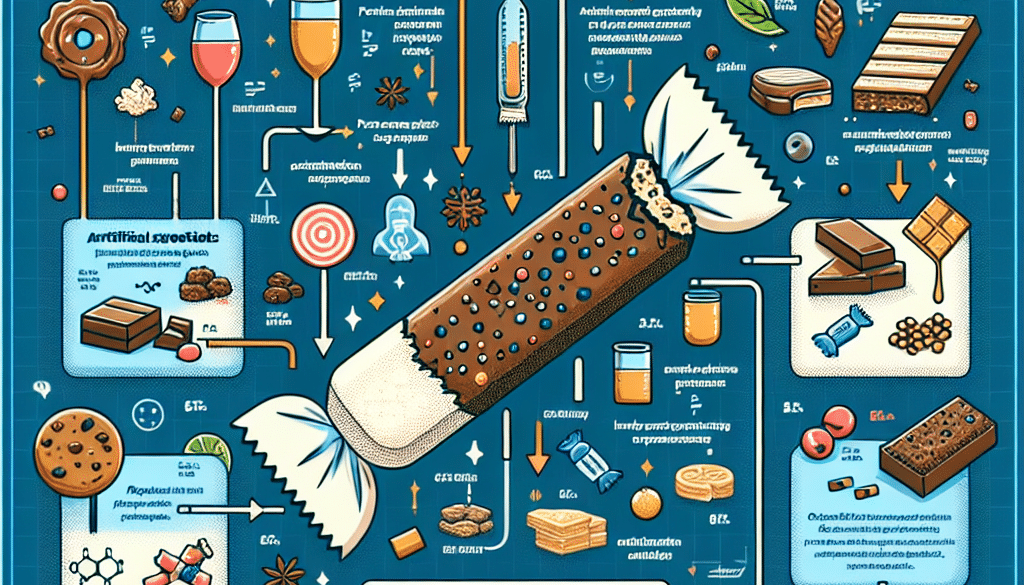Why Do Protein Bars Taste Bad: Decoding Flavor and Quality
-
Table of Contents
- Protein Bars Taste Bad: Unraveling the Mystery of Flavor and Quality
- Understanding the Ingredients in Protein Bars
- The Role of Texture in Taste Perception
- Flavor Masking Techniques and Their Limitations
- Case Studies: Successes and Failures in Protein Bar Flavor
- Consumer Expectations and the Evolution of Taste
- Statistics: The Impact of Taste on Protein Bar Sales
- Conclusion: The Future of Protein Bar Taste and Quality
- Discover ETprotein’s High-Quality Protein Products
Protein Bars Taste Bad: Unraveling the Mystery of Flavor and Quality

Protein bars have become a staple in the diet of many health-conscious individuals, athletes, and those simply looking for a quick, nutritious snack. However, despite their popularity and nutritional benefits, a common complaint is that many protein bars have an unpleasant taste. This article delves into the reasons behind the less-than-desirable flavor of some protein bars and explores how quality and ingredients play a pivotal role in determining their taste.
Understanding the Ingredients in Protein Bars
One of the primary factors contributing to the taste of protein bars is the ingredients used in their production. Protein bars are designed to be high in protein and often low in sugar, which can lead to a compromise in flavor. Here are some common ingredients that affect the taste:
- Protein Sources: The type of protein used, such as whey, soy, pea, or rice protein, can impart a distinct flavor. Some protein sources have a more pronounced taste that can be challenging to mask.
- Sweeteners: To reduce sugar content, many protein bars use artificial sweeteners or sugar alcohols, which can leave an aftertaste that some people find unpleasant.
- Fiber: High-fiber ingredients are often added to protein bars to enhance satiety, but they can also contribute to a gritty texture and a dull flavor.
- Preservatives and Additives: These are necessary for extending shelf life but can also affect the taste and freshness of the bars.
The Role of Texture in Taste Perception
Texture plays a significant role in how we perceive taste. The mouthfeel of a protein bar can greatly influence whether we find it enjoyable or not. A chalky or overly dense texture can make a protein bar less appealing, regardless of its flavor profile. Manufacturers often struggle to balance the need for a high protein content with a pleasant texture, leading to a variety of mouthfeels in the market.
Flavor Masking Techniques and Their Limitations
To improve the taste of protein bars, manufacturers employ various flavor masking techniques. These can include the use of strong flavors like chocolate or peanut butter to cover up the taste of protein powders. However, these methods have limitations and can result in an overpowering or artificial taste that does not appeal to all consumers.
Case Studies: Successes and Failures in Protein Bar Flavor
There are numerous examples in the market of both successful and unsuccessful attempts to create a tasty protein bar. Some brands have managed to find the right balance of ingredients and flavors, resulting in a product that is both nutritious and enjoyable to eat. On the other hand, there are also many products that have received negative feedback due to their poor taste, highlighting the challenge that manufacturers face.
Consumer Expectations and the Evolution of Taste
As the market for protein bars grows, so do consumer expectations. People are no longer willing to sacrifice taste for nutrition, leading manufacturers to continuously innovate and improve their products. This has resulted in an evolution of the taste of protein bars, with newer products often offering a better flavor experience than their predecessors.
Statistics: The Impact of Taste on Protein Bar Sales
Consumer surveys and sales data indicate that taste is one of the most important factors in the purchase decision for protein bars. A protein bar that tastes bad is unlikely to be a repeat purchase, no matter how nutritious it is. This has a direct impact on sales and is a driving force behind the industry’s focus on improving flavor.
Conclusion: The Future of Protein Bar Taste and Quality
In conclusion, the taste of protein bars is influenced by a variety of factors, including the types of protein used, sweeteners, fiber content, and the presence of preservatives and additives. The texture also plays a crucial role in the overall flavor experience. While manufacturers have made strides in improving the taste of protein bars, there is still room for innovation and enhancement. As consumer expectations continue to rise, the industry will likely see further advancements in the flavor and quality of protein bars.
Discover ETprotein’s High-Quality Protein Products
If you’re in search of protein products that prioritize both taste and quality, ETprotein offers a range of options that cater to various dietary needs and preferences. Their commitment to producing organic, non-GMO, and allergen-free plant proteins ensures that you can enjoy the nutritional benefits without compromising on flavor. Whether you’re a manufacturer looking to create better-tasting protein bars or a consumer seeking a delicious and nutritious snack, ETprotein’s products are worth exploring.
About ETprotein:
ETprotein, a reputable plant protein vegan protein Chinese factory manufacturer and supplier, is renowned for producing, stocking, exporting, and delivering the highest quality organic bulk vegan protein and plant proteins. They include Organic rice protein, clear rice protein, pea protein, clear pea protein, watermelon seed protein, pumpkin seed protein, sunflower seed protein, mung bean protein, peanut protein etc. Their offerings, characterized by a neutral taste, non-GMO, allergen-free attributes, cater to a diverse range of industries. They serve nutraceutical, pharmaceutical, cosmeceutical, veterinary, as well as food and beverage finished product distributors, traders, and manufacturers across Europe, USA, Canada, Australia, Thailand, Japan, Korea, Brazil, and Chile, among others.
ETprotein specialization includes exporting and delivering tailor-made protein powder and finished nutritional supplements. Their extensive product range covers sectors like Food and Beverage, Sports Nutrition, Weight Management, Dietary Supplements, Health and Wellness Products, and Infant Formula, ensuring comprehensive solutions to meet all your protein needs.
As a trusted company by leading global food and beverage brands and Fortune 500 companies, ETprotein reinforces China’s reputation in the global arena. For more information or to sample their products, please contact them and email sales(at)ETprotein.com today.












